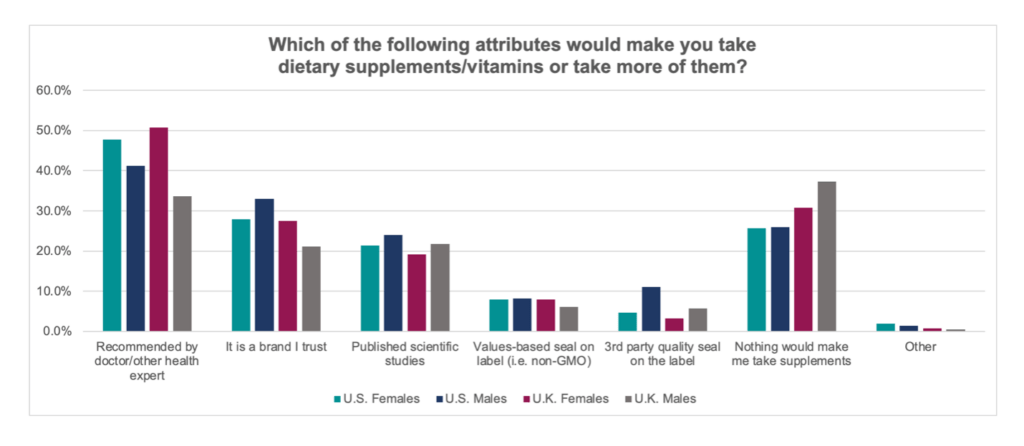Blog
Over the past two years in large part due to efforts to maintain/boost immunity against COVID, the consumer base taking supplements has broadened with many taking proactive steps to ensure wellness. Additionally, we have seen the evolution of multivitamin consumers as they broaden their use into other categories such as omega-s, vitamin D, prebiotics, making them higher lifetime spenders – if we can keep them in the category.
Future success of the supplement industry will depend not only on the experiences of these new consumers, and broadening the categories they consume, but in also maintaining our strong user core and if possible, getting even these folks to take more supplements more regularly.
Trust Transparency’s ITC (Ingredient Transparency Center) program conducted a snapshot survey of 1000 US consumers and 500 UK consumers, asking them what attributes (selecting up to 3) would make them either begin taking supplements, or to start taking more. Response options included: a doctor or health expert recommendation, a brand they trust, published scientific studies, a value-based seal on the label, a 3rd party quality seal on the label, or the final selection, ‘nothing would make them take supplements’. Females were highly engaged in this survey—they were more likely to select the maximum of up to 3 responses whereas males typically answered only once or at most twice. This led to a significant percentage response difference between the genders.
In both the US and UK, the top response was a doctor or other health care professional recommendation (45% in the US and 44% in the UK), reinforcing the influence of that professional group and underscoring the need for additional engagement. Next up in the US was trust in a brand at 29%, while in the UK, 33% of consumers surveyed admitted that nothing would make them take supplements – a serious disappointment. That negative response stood at 26% in the US while the health care professional response stood at 24% in the UK. Third up in both countries was published scientific studies (22% in the US and 21% in the UK).

The survey pointed out gender differences and priorities in each country as well in addition to the engagement difference. A recommendation by a doctor or healthcare expert topped the list for all, with it being the most important to UK females (50.8%). A trusted brand was second most important to both female groups and US Males, but UK males ranked published scientific studies as their second choice. US men and women were nearly equal at 26% and 25.7% percent respectively on saying nothing would make them take supplements and nearly 40% of UK males said nothing would make them take supplements.
There is a lot to process in this information, which arguably would have been different had respondents been asked which statement ‘best’ described their current thinking. We’ll get to that in future work. In the meantime, the stark difference in importance between values-based certifications (supported strongest by females) and quality-based certifications (supported strongest by males) is interesting and worth pursuing.
~Len
